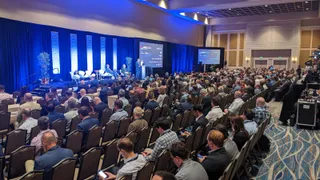US Army Reserve conducts readiness-focused field training exercise
Contact Our Team
For more information about how Halldale can add value to your marketing and promotional campaigns or to discuss event exhibitor and sponsorship opportunities, contact our team to find out more
The Americas -
holly.foster@halldale.com
Rest of World -
jeremy@halldale.com

The U.S. Army Reserve 383rd Quartermaster Battalion (QB), headquartered in El Paso, Texas, conducted a readiness focused field training exercise (FTX) April 4 - 7, 2019, in Dona Ana, New Mexico.
Time is always a challenge for the Army Reserve as traditional drilling soldiers only conduct their military duties one weekend a month with 14 to 29 additional training days to use sometime during the fiscal year. Field training exercises like this one allow units to maximize their training time, focusing on tasks and drills that build capability and increase their combat-readiness.
Lt. Col Marc Braswell is the commander of the 383rd QM BN.He said he planned this four-day FTX to get soldiers out of the classroom andinto a realistic training environment.
"Soldiers need training on basic soldier skills so theyhave to get out of the reserve center,” said Braswell. “We have to get out ofthe classrooms and get into the field environment where we can have real combattraining."
When Braswell took command a year ago, he saw a missedopportunity in the way the unit trained. He reorganized his weekend battleassemblies to allow the unit to go into a field environment every quarter.
"No one joins the army to sit in a classroom, soldierswant to get out and train,” said Braswell. “When I took command, I told the soldiers,if you [ever] feel like I’m wasting your time, and not giving you realistictraining, you need to tell me. That’s the promise I made.”
The transition hasn’t been completely smooth, but that’swhat Braswell expected, and it’s what he wanted. He explained that he wants hisunit to hit bumps and work them out in training so they are ready andexperienced if they are called upon for deployment.
"Bottom line is, we are going to make this happen,”said Braswell. “Whatever hiccups we have, whatever problems we encounter, thoseare natural parts of the growing process, so I expect friction but we arepushing through it.”
1st Sgt. Anthony Rogers, with the 356th TransportationCompany, part of the 383rd QM BN, said he had challenges to overcome to get hissoldiers to the FTX. As a new Ready-Force unit, they are still being filledwith equipment and only had five vehicles, not nearly enough to carry all theirsoldiers to the field.
“We will overcome it by pure will and ingenuity,” laughedRogers. “Our higher command knows the challenge, and we are working it, but themission doesn’t stop.”
Rogers and the 356th’s brand new commander, Capt. ZacharyWise, coordinated with other units in the BN for transportation support. That’sexactly the kind of solutions Braswell expects his leaders to come up with.
"It comes down to a paradigm shift,” said Braswell, “Iam helping people understand that this is what we are going to do now and thisis a different experience than they’ve had the past four years.”
Another challenge came once the communications team arrivedat the training site. They set up two OE-254 communication antennas and thecommand post's communication kit, then immediately ran into a problem withpower.
"Right now we are trying to get another generator so wecan run on our own,” said Spc. Demetrus Jacobs, a signal support specialistwith the 383rd QM BN. “When we go to the field, we put out heads together tomake sure we have everything we need and make it work.”
Jacobs prefers field training to sitting in a classroom. Herecognizes the value it brings to him and his fellow soldiers. He says it’simportant because his unit has to be ready to mobilize and deploy if they areneeded."I think hands on is always more valuable," said Jacobs."You get more out of it than sitting in a class.”
Braswell feels very positive about these FTXs. Soldiers arepracticing their skills, morale is going up and the units are overcomingchallenges. Most importantly, the BN’s combat-readiness is improving.
"If we don’t get the soldiers out here to train on thesetasks, we are really cheating them,” said Braswell. “We have to stick with itand move forward because just getting the BN out here and working the processis a win.”


